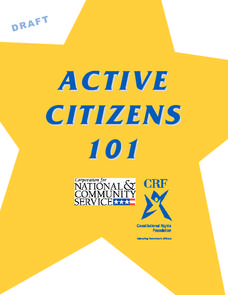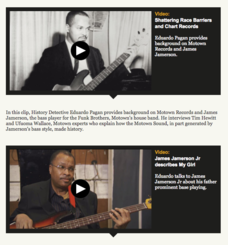Curated OER
Southern Support During the Civil War
Students investigate primary documents to help them answer the question of whether of southern soldiers and citizens abandoned the Confederate cause as the war progressed.
Curated OER
Music, Slavery, and the Civil War
Students explore the role of the spiritual played during the period of slavery and the Civil War. They listen to and analyze various forms of spirituals They gain an awareness of how music reflects cultures and social issues.
Curated OER
Living History - Civil War
Eighth graders, after researching antebellum North Carolina and the role of North Carolina in the Civil War, write, edit, publish, and produce their own plays.
Curated OER
To Arms!: Recruitment of Civil War Officers
Students read and compare two Civil War recruitment advertisements from different years in the war. They decide how people's feelings about the war may have changed over the years by examining the tone of the advertisements.
Curated OER
Separate is Not Equal: Brown v. Board of Education
Students analyze photographs that feature segregation. In this human rights lesson, students examine photographs of a segregated movie theater, a Ku Klux Klan gathering, a segregated business sign, and an illustration from "Harper's...
Curated OER
Famous African-Americans for Animals
They research influential African-Americans who work to help animals. They recognize the contributions African-Americans have made to society and to the animal rights movement.
Curated OER
Active Citizens 101
Students explore and investigate multiple aspects of citizenship and democracy in a sequence of lessons that involve thoughtful discussin and participation to assist in gaining a better perspective of what citizenship and domocracy is,...
Curated OER
Food Security/Insecurity
Students gain awareness of global patterns of food distribution. They are introduced to the concepts of food security and food insecurity. Pupils investigate the nutritional status of others around the world using information from the...
Curated OER
No Choice!
Students investigate freedom. In this character development and U.S. history lesson, students participate in role playing in which the teacher assigns recess restrictions including whom they play with and what they play. Students discuss...
Curated OER
Governance- Grade 9
Ninth graders participate in talking circles about how their classroom will function. In this self-governance instructional activity, 9th graders participate in talking circle activities to create rules that will govern their class....
National Endowment for the Humanities
NAACP’s Anti-Lynching Campaign in the 1920s
Students investigate the anti-lynching campaign of the NAACP in the 1920's. In this human rights instructional activity, students prepare for and participate in a simulated debate of the Dyer Anti-Lynching Bill that was presented to...
PBS
The Sixties: Hitsville USA
James Jamerson. You probably heard him but may not have heard of him. But fans of Motown Records will certainly recognize his contributions to the sound that desegregated popular music during the 1960s. Challenge young history detectives...
National Endowment for the Humanities
Revolution '67, Lesson 1: Protest: Why and How
To some people, protesting is as American as apple pie, but the factors that lead to protests can be as confusing to veteran activists as to today's youth. Revolution '67 explores the riots in Newark, New Jersey as a case study. Using...
National Endowment for the Humanities
Revolution '67, Lesson 2: What Happened in July 1967? How Do We Know?
Even in a world in which dozens of participants and curious onlookers record every controversial event, the basic facts of what happened are often in dispute. Revolution '67, Lesson 2 explores 1967 Newark, New Jersey using an examination...
Stanford University
Beyond Vietnam
On April 4, 1967 Martin Luther King, Jr. delivered his speech "Beyond Vietnam." The controversy that followed is the focus of a three-lesson unit that asks class members to consider the political and social implications of King's stance.
Anti-Defamation League
Harriet Tubman on the $20 Bill: The Power of Symbols
How important are symbols and symbolic gestures in society? Middle schoolers have an opportunity to analyze the importance of symbols on American currency with a lesson plan that investigates the controversies surrounding redesigning the...
Center for Instruction, Technology, & Innovation
Did African American Lives Improve After Slavery?
The Civil War made slavery illegal, but all ex-slaves were not totally free. Scholars visit eight different classroom stations to uncover life during the Reconstruction Era in America. Groups discover items such as Black Codes, 13th,...
Mississippi Whole School Initiative
Dream Big...With Your Eyes Wide Open
For many people, Barack Obama's presidency was the next step in Martin Luther King, Jr's dream of America's future. Explore the dreams of Americans past and present, as well as the young Americans in your class, with a set of activities...
Roy Rosenzweig Center for History and New Media
Rosa Parks and the Montgomery Bus Boycott
Participants examine two documents related to Rosa Parks and the bus boycott, sources that challenge some of the commonly held preconceptions about Rosa Parks. They then respond to discussion questions to reinforce understanding and...
Facing History and Ourselves
The World the War Made
The United States Civil War forced Northern and Southern societies, as well as the people who made up those societies, to reconstruct their vision of themselves and their identities. A series of video-based web lessons look at the great...
American Battlefield Trust
Southern Secession and Abraham Lincoln’s Presidential Election
President Abraham Lincoln: a true humanitarian or a savvy politician? The lesson focuses on Abraham Lincoln's presidency and the secession of the southern states. Academics interpret how Lincoln's presidential platform promoting African...
Curated OER
Lincoln, Emancipation, and the Constitution
Learners determine how President Lincoln promoted emancipation. In this slavery lesson, students examine primary documents, including the U.S. Constitution, to reconstruct Lincoln's attempts to end slavery and deliver the Emancipation...
C-SPAN
Presidential Veto and Congressional Override
One of the key powers of the executive branch is the president's ability to pass or veto legislation proposed by Congress. Congress, the legislative branch, on the other hand, can override a president's veto. Five film clips show how the...
Cheryl L. Mason and William G. Thomas
Southern Patriotism
Patriotism in the South and notions of patriotic sentiments are examined through primary document analysis. Learners read articles and letters written in the pre-war South to determine the role patriotism played in spurring on the war....
Other popular searches
- Civil Rights Movement
- Civil Rights Act
- Civil Rights Harriet Tubman
- Civil Rights Music
- Civil Rights Movement Music
- Civil Rights Act 1964
- Civil Rights Era
- Civil Rights Act of 1964
- Civil Rights Legislation
- Children's Civil Rights
- U.s. Civil Rights
- American Civil Rights Movement

























